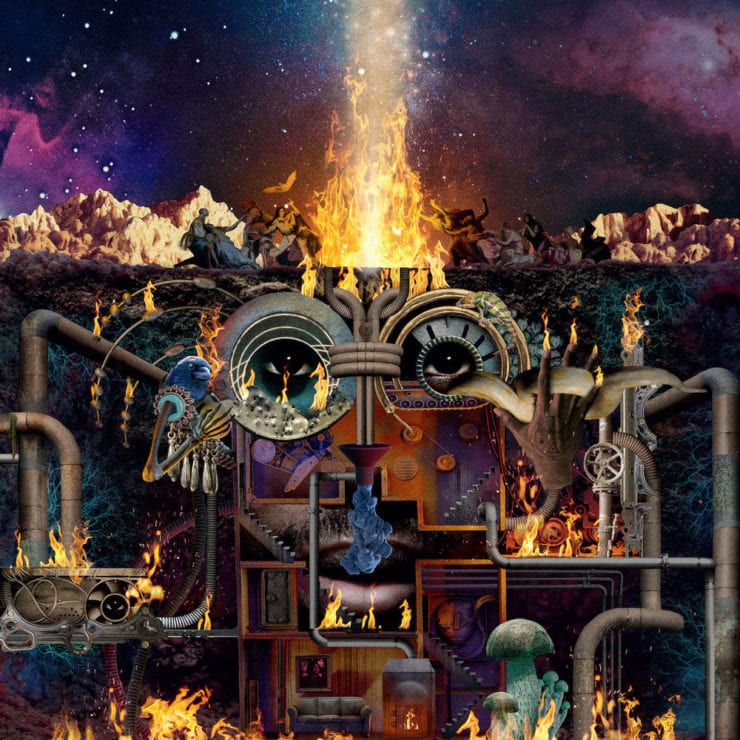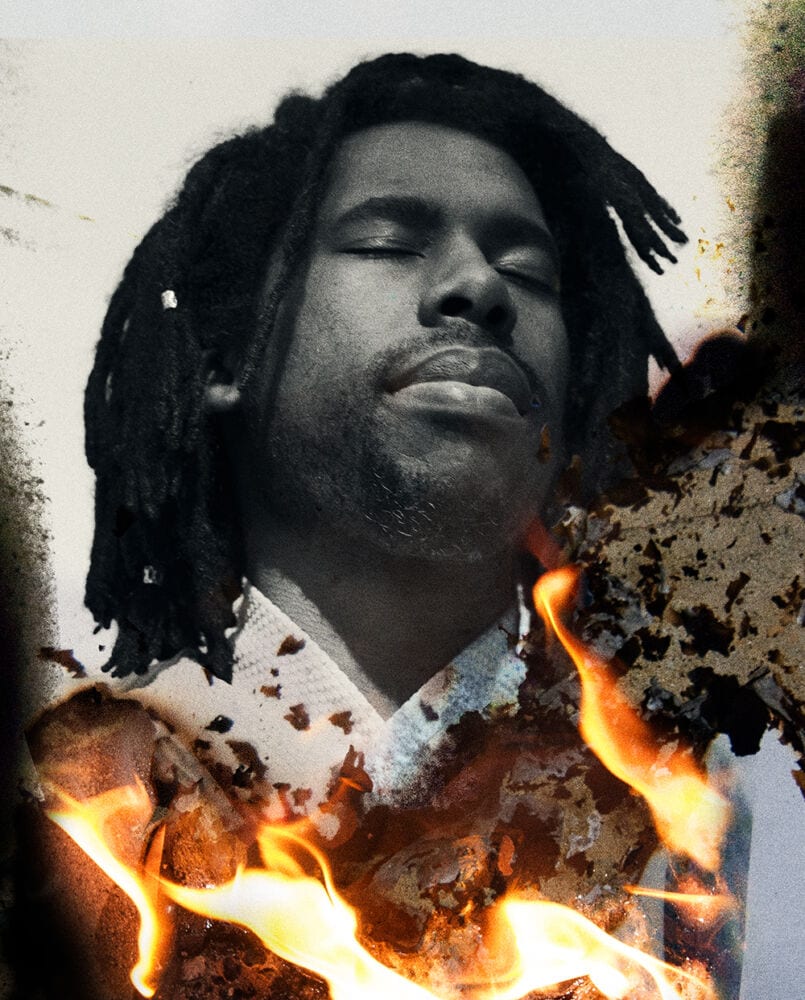
"Flamagra is a deep, meditative record, with many layers to mine both metaphorically and materially"
Over the past decade Flying Lotus has become a touchstone for progressive hip-hop based music. An early adopter of a more extreme post Dilla wonk that opened the floodgates to a slew of genre bending, Soundcloud populating, Ableton enabled beat-smiths, Steven Ellison’s status as seer of new musical directions has been well earned and firmly cemented. With the saintly, spirit of the Coltrane family imbuing his musical atmosphere, Flying Lotus has moved through new and prescient sonic territory with regularity and ease.
Although his Brainfeeder imprint makes space for other like-eared musicians to explore their particular brand of noise, notably Thundercat and Kamasi Washington, Flying Lotus makes music that is his and his alone. Lotus’s music brings together a myriad of voices from the far reaches of black music history, afro-futuristic concepts, spiritual jazz, protest music, electronica, improvisations, computer game soundtracks, modern composition, hip-hop, disco, funk, acid and all their grey areas, into two minutes of fragmentary, digitally catalysed, head bopping, sonic coagulate.
This is not such a new idea, indeed it’s the logical extension of hip-hop sampling practices. However, to execute such a complex yet singular aesthetic so convincingly is rare, especially with such clarity of musical vision and technical expertise. His compositions shape shift between decades and universes in the pauses between over compressed skittering high hats. When you give up trying to process every reference and just allow the intricacy of the movements to be its own unique and hybrid voice, his compositions leave you totally engrossed and simultaneously bewildered.
This music is full of synaptic electricity, it fizzes with floods of ideas, fidgety, unable to sit still, but simultaneously at peace with itself. FlyLo’s music is decentered, intra-weaving, and laterally combines a myriad of codes, the sonic equivalent of a negative dialectic, Lotus’s compositions simultaneously thump and confound.
Starting with 2006’s “1983” and ending with 2013’s “You’re Dead”, a record many consider to be the zenith of his output thus far, punctuated by the future classic “Cosmogramma”, Lotus has succeeded in adapting and manipulating these many interconnected yet disparate elements, into a shape that remains coherent and soulfully expressive. Record number six, ‘Flamagra’ has been five years in the making, and is a hefty piece of work, with twenty-seven tracks constituting over an hour of listening.
Ellison explains that the concept for the record came from envisaging a movie scene where a kid sees an eternal fire burning on the hillside and says to his Mum ‘I don’t think this fire will ever go out.’ As you listen to ‘Flamagra’ with this image in mind, one begins to wonder if the kid is a metaphor for Ellison himself keeping the flame of his black musical heroes alight.
Lotus has been described as making music for the digital age, flipping irreverently from sound to sound, floating free of generic convention and context. But as the novelty of transience starts to wear thin, and the poverty of postmodernism robs the contextual energy of much of the music that is sampled and re-appropriated in the mainstream paradigms, borrowing has to become more than just moving sounds around.

"FlyLo's music is decentered, intra-weaving, and laterally combines a myriad of codes, the sonic equivalent of a negative dialectic, Lotus’s compositions simultaneously thump and confound"
By taking a sample, one is slicing into its social, historical and political context, trying to separate the two is like trying to take one ingredient from a well shaken cocktail, you can’t. So, to bring us back to the metaphor, Lotus is engrossed in the flames, trying to capture and understand each fleeting movement, deeply parsing how the materials burn, what gives them energy, and how best to harness it.
Obsessively listening to and repeating these movements, hearing and translating the ancestral voices emanating from the embers of these old sounds, He brings about an altogether new connection to the past. Lotus is trying to capture the energy and reverse the destructive effects of the fire, to reignite something to warm the coldness of the contemporary world, to counter digital alienation.
Now more than ever there are grooves that need setting alight, but we need new materials to let them MFs burn. This is bricolage with hands to sky in thanks. Where other musical movements have wanted to destroy their heroes, laying claim to a vaporous originality, there is something more interesting happening with Fly-Lo. More ‘bric-homage’ than simple decontextualised appropriation.
This idea of ‘bric-homage’ to describe Lotus’s practice could be summed up by the first track on the record ‘Heroes’. The first sound we hear is the fire, and the voice emanating from within says, ‘[we] are now joined together again, in the space you‘ve created. The world has changed and so have you, you’re different now’. This statement seems to be addressing the music itself, and Ellison’s relationship with it and therefore the people who have inspired him to make these noises.
The track itself, gives us choral voices, jazz inflected chords, crunching claps, layered, arpeggiated, and swelling crystal string synth lines, filtered and panned spoken word vocals, punching, gridded kicks, swollen, ever swaying bass, and white noise hissing in and out of the angelic vaulted voices. A short yet detailed introduction to Fly-Lo’s sonic heroes. It is like opening a door to a party and Lotus saying ‘look everyone’s here, let’s talk, you gotta find out who these people are’.
This double album presents us with a number of these conversations. Anderson Paak is breaking chains on a nice piece of bumping, jazz inflected neo-soul. ‘Burning Down the House’ with the legend George Clinton is an excellent piece of work. Again, it speaks to the idea of trying to capture past energies and make them speak to a new time. This track bumps like an authentic P-Funk jam, with echoes of ‘Atomic Dog’. But this is Lotus-Funk that brings a certain darkness, an introspective quality, a mystery.
It’s like a George Clinton has become a psychedelic version of Colonel Kurtz. The errant captain of the ‘Mothership’ has locked himself away down in the bowels of his spacecraft. He has a map to the utopian side of the universe but happily refuses to share this knowledge, as he sings ‘I know something they don’t know’ whistling off to a new dimension. He has a warning for all the space pirates chasing him for the map, ‘you better watch your step’ and if they try to put him out, their firemen will all be ‘choking in all the smoke.’ Flying Lotus has been able to tune into this distant broadcast and channel it, like a cosmic ray dropping out of atmosphere into our living rooms.
‘Takashi’ is a track that sums up some of the ideas that ‘Flamagra’ is grappling with. It opens with a reggae lilt that could be considered chintzy but it doesn’t hang around long enough to be offensive. Indeed it proves a perfect foil for the jazz-funk direction that follows. It might be said that some early 2000’s broken beat fare, Kaidi Tatham, Domu, Seiji, and the rest might have done it better in singular outings, but it is the breadth, and the fleetness of foot that Lotus displays which take this to another level.
The opening few songs have a lighter tone than previous Flying Lotus work, it’s a brightness reminiscent of Roy Ayer’s later work, and this tone is especially present on ‘Takashi’. But it’s Roy Ayers rendered through a Richo chip. The ‘left field beat-makers notoriously trade in very short pieces of music and the arrangement of Takashi replicates this trend. The elements, ideas and phrases are never quite allowed to get comfortable, and keep the whole track moving happily along like a character chewing up tokens on a platform game.
‘Takashi’ harnesses the same energy as teetering on the edge of losing a life in a computer game. It is the building of tension as you try to prevent your character from spiralling into the edge of chaos that keeps you hooked, and it the same fine line that Lotus treads. Over complication can cause a fatal mistake. So like any good storyteller Lotus is adept at knowing when an idea has played it course, and how to ensure the ever deepening sub plots keep us wanting to play. ‘Takashi’ is followed by the track ‘Pilgrim Side Eye‘ a track that feels like Kool and the Gang’s ‘Electric Frog’ with hints of Eugene McDaniels, as Thelonius Monk is doing a drive-by shooting, crashing chords through the studio windows. It trips over itself with a languid urgency, a quality that belies much of Lotus’s work.

"Lotus is trying to capture the energy and reverse the destructive effects of the fire, to reignite something to warm the coldness of the contemporary world, to counter digital alienation"
There are three tracks at the center of the album that really highlight the cinematic nature of this record and have a great deal to say about the way in which Flying Lotus, in combination with his collaborators, plays with notions of representation. ‘Yellow Belly’ feat. Tierra Whack is an off kilter, bedroom sounding jam, which is adorned by odd, interesting and ultimately engaging utterances from Whack. These are somewhat paranoid, and allude to feelings of being watched, as she asks, ’are you there, baby?’ and ‘are you a spy mister?’ This claustrophobia is further heightened by the creeping nature of the beat, where a resolving minor chord engenders a sinister and surreal atmosphere.
We don’t know who is watching or why, but there is the notion of being looked upon, being seen, being represented, and questions of how to handle that voyeurism. Whack is trying to be herself but ‘he says I’m trippin’. The track alludes to an uncomfortable undercurrent of the insidiousness of gendered power relations, which lead us to ‘Black Balloons’ feat Denzel Curry, a track that confronts inequality head on. It is a track that gives us a very different notion of the creeping melancholy that underlies much of this record, because its narrator is overtly angry. Lyrically these two songs move from the surreal to real, quick sharp.
Curry is incensed on this track, fighting back against a system that sends the same spies who are watching Whack. He questions the consequence of misrepresentation. He questions the effects of constant oppression, and struggles to see a way out. As with Whack this song is claustrophobic, our narrator is trapped by futility, rapping that ‘we all die the day the black balloon explodes, we all die, no one can handle the truth, we all lie, and wait to see the real exposed, but I kick the funky truth until my casket close.’ This is protest music for a jilted generation, whose political systems have ignored them, and provided them with virtual avenues for dissent that produce virtual solutions.
This song questions those who don’t value human life and is a crushing indictment of the hegemonic maintenance of the divisions that ultimately lead to murder. The track reuses a sample from the ‘La Planete Sauvage’ soundtrack by Alain Goraguer coupled with a Melvin Bliss ‘Synthetic Substitution’ break. These couple of crate digger sure shots give the track a straight up boom bap feel. Here too the samples are exposed, in way that makes reference to hip-hop’s golden age, when rappers were able to speak for their communities in ways that were unconstrained by their brand.
Lotus then adds further layers of instrumentation, more choral voices and excellent string arrangements that take it into epic cinematic, Ennio Morricone territory. This gives the track a weightiness and might that is needed to carry such vitriol. It is interesting to note that the choice of sample is from ‘La Planete Sauvage’ an animated film that tackles themes of oppression and slavery, and brings into focus what it is to be human.
The effect of external pressure, factors beyond our control, is also at work in the next track ‘The Fire is Coming’ feat David Lynch. Here Lotus presents a spoken word piece by Lynch illustrated with sound effects and that all-important fire burning away in the background. The story, typically Lynchian in its exploitation of the eerie, again has paranoiac overtones.
A kid takes a call while his mother and father do chores, one sawing wood, ‘in a big plume of agitated sawdust’, whilst his mother is in the garden, ‘visibly upset about her flowers condition’, which are covered in a greasy black film that won’t be washed away. When the phone rings the kid runs to the garden to get his mother who asks, ‘who is it?’ The boy replies, ‘I don’t know, it’s a man, he said you would know what it’s about?’ The voices transmogrify from Lynch, to the boy, to the grease on the plants, to the fire itself coming into view burning over the horizon. As the phone call comes in and intrudes on the safety of the house we are moved outside where weird happenings are afoot.
There is danger in the fire-scorched air, and the music urgently reminds us of that. In his films Lynch explores ideas of stories within stories, reality and unreality, simulacra, smoke and mirrors. As curtains are pulled back, new worlds are exposed, ones that somehow resemble those we know, but in forms that reassemble the familiar.

"As curtains are pulled back, new worlds are exposed, ones that somehow resemble those we know, but in forms that reassemble the familiar"
Lotus’s songs also skulk in the shadow of the weird, yet find a constant touchstone in the contemporary world, as is the case between ‘Yellow Belly’ and ‘Black Balloons’. Sitting centrally in the record ‘The Fire is Coming’ with Lynch’s sibilant drawl, and urgent drum pattern make this track a pivotal piece in the story of the album and in the list of characters that Lotus is drawing on to create the woozy worlds of his music stories.
There are lots of great musical ideas in this record, as one would expect from a producer of Flying Lotus’s caliber. ‘Andromeda’ gives us a DJ Shadow, Axelrod kind of vibe. There is the gypsy jazz of ‘Say Something’ that presents something of new direction, but I would argue creates a space to connect the folksy and reggae inflections that we hear popping up throughout this record, indeed throughout you can hear the wiry clavinet lines of Earl Lindo’s duppy.
There is the obligatory Thundercat collaboration, a strong slice of soulful introspection, that is as groovy as anything that the pair have released, but doesn’t quite live up to the heady heights of ‘Drunk’s swaying craftiness. Toro Y Moi makes a well-placed appearance on ‘9 Carrots’ a shoe gazing, sunshine, stepper. ‘Land of Honey’ featuring Solange gently caresses it way into your psyche, and with the final key change, violin solo, and disembodied robotic voices underpinning hallelujah, this is a powerful invocation of the spirits, drawn from the funeral pyre of the old order, Solange sings ‘you fall from the land of honey, where there’s land of promise, all from the land of hunts, all from the land of light, all from the land, that’s us, when you see smoke, there’s fire. Hallelujah!’
The crackling of a fire is familiar and comforting, bringing together birth and death in heat and energy. It’s altogether different every time the fire is lit, the materials react in new ways, being ever original. The wind, humidity, space and air all have their effect on the rhythms with which it burns. The variety is life affirming, it is this moment, it does not want to be, it should not be and cannot be repeated, it is experiential.
This is the trick that Ellison plays so well, recorded music, digital music, that breaks free from some of the constraints of repetition. In this album, it feels like the fire draws us, the watching kid, or Lotus and his plethora of channeled voices, into its constantly shifting layers, its ancient mystery, and its transformational power.
As the album burns down we get smoky together, inhale a bit too deep, loose our sense of place and start speaking in tongues. This is a record of multiple headed representations, and new visions of contemporary interiority and exteriority.
‘Flamagra’ is a deep, meditative record, with many layers to mine both metaphorically and materially. It sets up a hermeneutical challenge. ‘You’re Dead’ walked its listeners through an experience which is linear by its nature, death the inevitable end. Whereas ‘Flamagra’ is more meandering in its expression, it flicks and flutters like the endless manoeuvring of the energetic flames it attempts to capture. The edges of the songs fray in the embers and find a single fiber as a fuse for the next.
There could be an argument that we’ve heard too much of Thundercat’s bass runs, combined with ‘Headhunter’ infused chords progressions, the soaring voices of the Art Ensemble of Chicago, clobbered together through digital crushers. But this is a collective who need to keep playing together to establish this sound as a voice, as a movement.
This is work that takes the fragmentary decontextualisation of the digital listening paradigm and gives it weight again. This is a record about postmodern confusion, but one that uses these musical flakes as vehicles to find innovative solutions to knowing too much about too little. It exists in the liminal spaces of increasingly fractured ontologies, and grasps onto these shards with purpose, reason and humanity.
‘Flamagra’ is out now on Warp Records. Order a copy from Bleep.
TRACKLIST
1. Heroes
2. Post Requisite
3. Heroes In A Half Shell
4. More
5. Capillaries
6. Burning Down The House
7. Spontaneous
8. Takashi
9. Pilgrim Side Eye
10. All Spies
11. Yellow Belly
12. Black Balloons Reprise
13. Fire Is Coming
14. Inside Your Home
15. Actually Virtual
16. Andromeda
17. Remind U
18. Say Something
19. Debbie Is Depressed
20. Find Your Own Way Home
21. The Climb
22. Pygmy
23. 9 Carrots
24. FF4
25. Land Of Honey
26. Thank U Malcolm
27. Hot Oct.
Discover more about Flying Lotus and Warp Records on Inverted Audio.